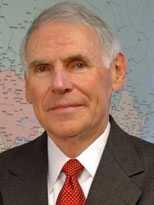He has been in all the world's hot spots in the last 40 years -- both as soldier and commander -- and now Admiral William J. Fallon brings his hands-on experience and wide-ranging knowledge to MIT's Center for International Studies (CIS).
Fallon, the former commander of U.S. Central Command and U.S. Pacific Command, joins CIS this fall as a Robert E. Wilhelm Fellow, bearing a breadth of knowledge gained from everything from flying combat missions during the Vietnam War to seeing action in the Balkans and first Gulf War to overseeing U.S. military operations in Iraq and Afghanistan.
"Admiral Fallon brings to our researchers and students a wealth of experience at the highest level of strategic thinking in many of the world's most demanding assignments," says Richard Samuels, CIS director and Ford International Professor of Political Science.
Fallon, who led CENTCOM from March 2007 to March 2008, also paid a high price for his convictions, retiring after a magazine profile depicted him as challenging President George W. Bush's Iran policy.
With 41 years of distinguished service under his belt, Fallon, nicknamed "Fox," brings a personal knowledge of places and people on the world stage. Soft spoken and reflective, Fallon nevertheless displays a military bearing and admits to being "pretty strongly opinionated."
Fallon says he wanted to come to MIT because the school was "focused on solutions to problems -- and there are quite a few of them out there."
He rejects a sound-bite approach to foreign policy and hopes to impress upon students how many of the seemingly recent international problems result from centuries-old conflicts with ethic, religious and historical overtones.
The antagonism between Georgia and Russia, for example, "was a tinderbox, and activities by both parties contributed to this." There was little -- if anything -- the United States could do, even if action was called for, he says.
Likewise, Fallon cautioned against a simplistic view of the resurgence of violence in Afghanistan. "I don't think you can isolate Afghanistan from the region, certainly not now," he says. "Lots of folks are called Taliban, but this is not in my opinion some easy-to-identify, ideologically pure" group.
In Afghanistan, "authority has never been well done from the top down; there are lots of local issues. The idea that we from the outside can turn this place into a Garden of Eden is wishful thinking," he says. "Nonetheless we can play a significant role and we are doing a lot for these people -- as are a lot of countries in the world."
Iraq's much-touted increase in security, likewise, has multiple causes. "The surge of additional forces helped, certainly," Fallon says. But just as important were "the changes in tactics, the way we went about doing business on the ground."
Specifically, "We actually got our people out to enforce security in some parts of the country -- particularly around Baghdad and in heavily populated and mixed areas, which were pretty lawless and all kind of militias were at play. Al-Qaeda was instituting major trouble from Sunni areas; Iran was aiding and abetting militias on the Shia side and they were tearing the place apart."
Also: "The Iraqi people had just about had enough." They turned from active support or passive acceptance of insurgents to helping American forces, Fallon says.
Fallon envisions a continued draw-down of American forces in Iraq but he is very clear that a long-term security agreement between the two countries would be in the best interest of both. "There are many things the Iraqis are not quite capable of doing today. We can do them. They want to do them. They'll get there. But there needs to be an agreement in principle and then you can work on the details," he says.
A version of this article appeared in MIT Tech Talk on September 17, 2008 (download PDF).






